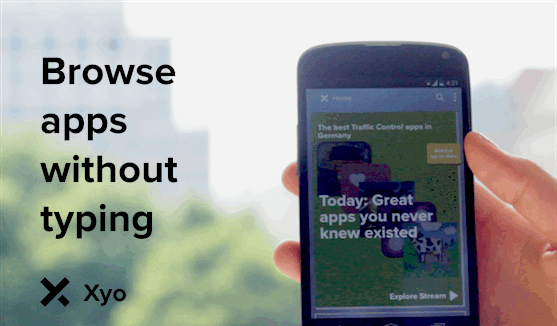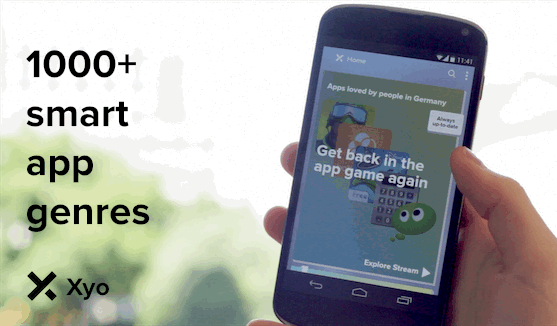A number of companies have tried their hand at introducing their own app-discovery services as alternatives to the default mobile app stores, like iTunes or Google Play. Some have been fortunate to find an exit (like Chomp or Hubbl), when all was said and done. But few have managed to establish significant user bases of their own. Today, a company called Xyo is giving app discovery another shot with its first consumer-facing app offering a better way to search Android applications, like those found on Google Play.
But this time, there’s a twist.
Though the Xyo app is live on Google Play, the app itself is really more of a showcase of the technology that Xyo has developed.
While certainly generating consumer interest in the new Xyo app search service would be nice, the company’s real business model involves licensing its technology to partners. In fact, Xyo already has several partners lined up who will pre-load this new app on their devices (though Xyo isn’t permitted to disclose names at this time). And, as a part of the pre-load deal, Xyo will promote other apps from the partners in the recommendations it serves.
The company also does revenue-sharing for its app advertising services, so its potential partners have an incentive to promote the app. In addition, says Xyo co-founder Matthaus Krzykowski, the plan is to roll out other incentivization schemes in the future that will give the partners even more reasons to promote the app after it’s pre-installed.
As for the app itself, Xyo offers a touch-centric way to browse an app store without having to type. Instead, a user flicks through the app suggestions Xyo provides, which are based on 400 different signals – far more than many competing app stores and discovery services offer today. Badges in the top-left will help end users to better understand why each app was recommended.

For example, a new game might be recommended to you because you play “Candy Crush,” while others might just be suggested because they’re just universally popular.
The early results are promising. Says Krzykowski, users who have been testing the app browse over 30 apps per session without having to type a search query.

One of the interesting things about the Xyo technology, now over three years in development, is its understanding of narrow and even niche app subcategories. Only in the recent iOS 8 update did Apple introduce a longer list of subcategories for the applications it showcases on the iTunes App Store. Meanwhile, Google Play hasn’t implemented subcategories in its top-level navigation outside of the “Games” category.
But Xyo offers over 1,000 subcategories, which its system is able to automatically detect. And as you browse through the app, you’re also able to tap on these subcategories to dive into their “stream” as well as bookmark them in order to save them on the app’s homepage.
Xyo’s technology is available to its partners in a variety of different integration points – phones, tablets, app stores, messaging apps, watches, browsers and cameras. The company has particular traction for these integrations in Asia, and by next month, Xyo will be able to announce it has a top five global carrier as a partner, too.
While testing the app myself, I found the experience of browsing through Xyo very fluid and fast, and because of the way Xyo groups the apps, it’s easy to actually find new applications and games you may like to try. That being said, I’m still interested in seeing the top-ranked apps in a given app store or category, and this isn’t something an app discovery service provides. I’d likely return to Google Play at some point, as opposed to using Xyo for everything but the final download. (The app redirects to Google Play for installs.)
I’m not alone in having a hard time giving up Google Play. It’s very difficult to get a consumer to switch from the default app store for an alternative, studies have shown. That’s one of the reasons why Appsfire exited the app-discovery business last year to focus on native ads, and why others in the space have business models that no longer rely on consumer adoption, like Xplode.
Sometimes they go deep on a particular niche, like Appolearning does for education. But rarely do you see a pitch for a pure consumer play in app discovery these days, and Xyo, despite the fact it has a new consumer-facing app, is no exception.
